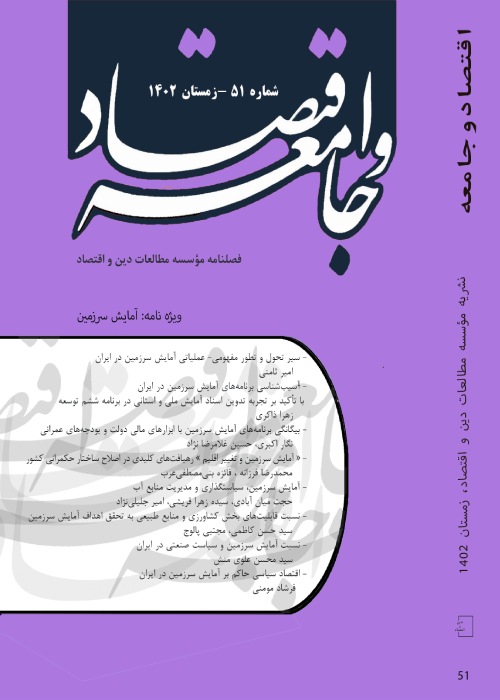Hesitation on thoughts of Douglass North in Economic Performance: Evaluation of Economic Shock Treatment Experiments from the Perspective of Cognitive Science
The new institutionalist school was formed alongside the old institutionalist beliefs, which combined economic science with social sciences and cognitive science to address the deficiencies of conventional economics. In this school of thought, identifying institutions and paying attention to people's cognitive characteristics were introduced as the first steps to solving the economic problems of any society. In the meantime, Douglas North has attempted to develop models of human behavior, especially in the face of uncertainty, with the help of cognitive science advances and to provide solutions to promote resilience in societies. But for some issues, there are insufficient explanations and need for further correction studies. This includes talking about the endorsement of the same mental models by environmental responses as well as the consolidation of these models as well as the formation of beliefs and learning, but about how it happens in the brain and mind, and how cognitive changes occur, especially in the face of Shocking factors and uncertainty conditions require a more complete explanation. Therefore, the present study seeks to study the effects of shocks from shock therapy policies by further studying the relationship between brain and mind and behavior (MBB). The purpose of this study is applied, developmental, and type of study, library and documentary, and is complemented by Douglas North's cognitive ideas with a new institutionalist approach. Also, with regard to the complete shock of Iranian society with various shocks, this study also studies the cognitive and socio-economic effects of political shock therapy in Iran. One of the findings of this research is the pivotal functions of the Prefrontal Cortex (PFC) in planning and then following it. So that the human prefrontal cortex regulates planned behaviors related to sensitivity to reward and punishment; and that more abstract representational or planning activities are performed in the APFC. The OPFC also plays an important role in decision-making, especially in the face of emotional factors. In the face of shocking hazards, both VPFC and VS are activated. In such a way that the striatum, independent of the type of shock, is associated with the loss of individuals. In general, from simple attention to complex decision making, all are made by the PFC. The role of the brain striatum in learning and habit formation can also be mentioned, such that information about shocks and uncertainties is transmitted through the striatum to the PFC, and since the striatum transmits information to the brain via dopamine neurons (with a combination of rewards), so by repeating a behavior and receiving rewards, that behavior becomes habituated, and the system of beliefs and mental models are formed. Another finding of this study is the similarity of the effects of shock-therapy policies with the effects of torture to confess inmates, which results in impaired normal brain functions and complete mental breakdown. The information rain and the unending shocks eventually lead to the formation of irrational beliefs in society and add to the uncertainty. As in Iran, following the structural adjustment programs of the 1970s, the people of Iran have had to endure the damaging consequences of years of shock therapy that has led to the formation of future horror beliefs. The lack of transparency in the country's big decisions, and the lack of a proper information flow system coupled with the constant manipulation of facts for unproductive interests, have created profound gaps in public opinion which has led to increased uncertainty in society and reduced the predictive power of actors and the level of resilience of society. Ultimately, Iranian society has entered a cycle of misery.
- حق عضویت دریافتی صرف حمایت از نشریات عضو و نگهداری، تکمیل و توسعه مگیران میشود.
- پرداخت حق اشتراک و دانلود مقالات اجازه بازنشر آن در سایر رسانههای چاپی و دیجیتال را به کاربر نمیدهد.


